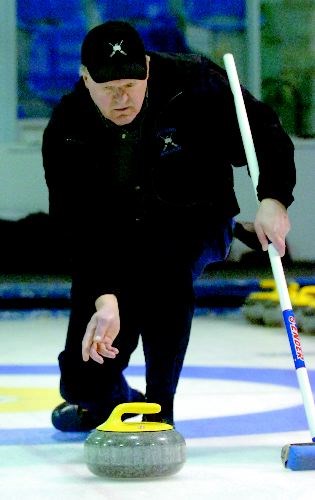For as long as he can remember, Terry Pipkey has had tunnel vision.
Born with a condition known as retinitus pigmentosa which results in the absence of peripheral vision, there could be light at the end of that tunnel for Pipkey next week at the Canadian blind curling national championship in Ottawa.
Playing second on a team that includes skip Shane McCreery, third Floyd Kennedy, lead Peter Henry and sweeper/alternate player Caroline Markel, Pipkey and the Prince George team are gunning for their first national title, having claimed the Western Canadian crown last year.
"This will be the first time in the 10 years that we've had a blind curling team put together in Prince George," said the 60-year-old Pipkey. "We're getting excited, it's getting so some of the players aren't sleeping so well."
They leave for Ottawa Sunday morning, with competition in the seven-team national event set to begin on Monday. The Prince George team won its berth in the national event as a result of its win in the final of the 2010 Western Canadian championships.
Pipkey's degree of disability is rated as B2 (able to see and count fingers at arm's length), whereas Henry is a B1 (totally blind, only able to see light on a bright day) and McCreery and Kennedy are in the B3 category (legally blind). Norm Carne is the team guide and coach and he has no legal visual impairment. Carne sets the broom in the nearest house on the ice to help the players align their shots and is allowed to help sweep the rocks but cannot call the shots or the hits.
"I can probably see halfway down the ice reasonably well, but the coach sets the broom maybe only 15 or 20 feet in front of me and I aim for his broomhead there," said Pipkey. "Further out than that, things start to fade out of my vision. Norm took over as our coach several years back and I think that's what got us into the upper echelon of curling. His skills as a curler really benefitted us.
"Some curlers have a magnification gizmo on their glasses but they don't work that well unless you're standing still. I'm still able to sweep between the hoglines, but because of my narrow field of vision I can't go into the house because I'm a hazard to be tripping over stones and I stay out of there."
McCreery, as skip, uses as monocular to enable him to see the far end of the ice and help make his shot decisions.
Pipkey first learned to curl in Duncan while attending high school in Shawnigan Lake. But he didn't get back to it until he started working for the Canadian National Institute for the Blind (CNIB) and decided, in 2001, to form the city's first blind curling team. Having worked 30 years in the sawmill industry for the Netherlands mill in Prince George, his eyesight worsened and that forced a career change. His office job at the CNIB put him in touch with clients who agreed to join him on the curling ice. Initially, there were 11 blind curlers in the city. That number has now dropped to six.
Blind curling is not part of the Paralympics due to the fact only three countries -- Canada, the U.S., and Scotland -- participate in the sport, but Pipkey said Canada is actively trying to promote it in other countries. B.C. and Ontario are the only provinces with provincial playoffs.
"People with visual impairment do make up one-half of a per cent of the total population," Pipkey said.
Prince George lost in the B.C. blind curling provincial final three weeks ago to the host 100 Mile House team. To keep sharp, the Prince George players are part of the Legion curling league at the Prince George Golf and Curling Club.
"We hold our own, we probably win as many as we lose," Pipkey said. "When we first started playing the seniors, boy you talk about some pissed-off people, getting beat by a visually-impaired team. But once they understand that we've been working at this for many years and we have our own competitions, then a lot of them are in favour of helping us out. And we're fun to play with."
The round-robin competition runs Monday through Thursday, with the top three teams advancing to the Page playoffs. Kelowna, the defending national champions, will be in Ottawa, under skip Dean Martel, formerly of Prince George.



